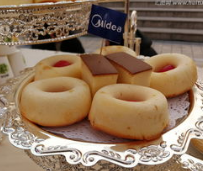In the US, families love to set out treats for Santa on Christmas Eve.
美国家庭喜欢在平安夜为圣诞老人准备点心。
Most churches also hold candlelight services or midnight mass, which often include reenactments of the Nativity.
大多数教堂还会在午夜举行烛光弥撒,通常包含耶稣降生场面的表演。
In Canada, families often open presents on Christmas Eve after mass. Others only open one and save the rest for Christmas Day.
加拿大家庭通常在平安夜做完弥撒之后打开礼物。还有些人只打开一个礼物,其余的礼物留到圣诞节当天打开。
Many French Canadians have a huge feast after Christmas Eve mass, called a Réveillon, which lasts into the wee hours of Christmas morning.
许多法裔加拿大人在平安夜弥撒后会举行一场巨大的盛宴,这顿名为Réveillon的年夜饭会一直持续到圣诞节的凌晨。
The fast typically lasts until after evening service or when the stars come out. After the fast, some might eat a traditional Russian dish called kutya. Kutya consists of grains, honey, and poppy seeds, shared from the same bowl to symbolize unity. No meat is allowed.
斋戒通常持续到平安夜弥撒之后或星星出来之时。斋戒结束后,俄罗斯人会吃一道名为kutya的传统俄罗斯菜,包括谷物、蜂蜜、罂粟籽,一家人都从一个碗里吃,以此象征团结。但是不能吃肉。

Christmas apples wrapped in cellophane are a popular holiday gift in China, which is said to be because the word "apple" sounds similar to "Christmas Eve" in Mandarin.
圣诞节的“平安果”就是用玻璃纸包好的苹果,在中国是很流行的一种圣诞礼物。据说是因为苹果的“苹”和平安夜的“平”谐音。
A huge seafood and pasta dinner is tradition for Italians on Christmas Eve. The tradition of serving seven different seafood dishes stems from the Roman Catholic practice of abstaining from meat on Christmas Eve.
意大利人平安夜的传统大餐有海鲜和面食。“七鱼宴”上有七种不同的海鲜菜肴,吃海鲜的传统源于罗马天主教徒在平安夜不吃肉的做法。
In Denmark, people celebrate Christmas Day on December 24. The Danish also countdown to Christmas using Advent wreaths. Wreaths feature four candles, one candle lit every one of the four Sundays leading up to Christmas Eve.
丹麦人在12月24日庆祝圣诞节。丹麦人用降临节花环来做圣诞节倒计时。降临节花环上有四支蜡烛,平安夜前的四周,每个星期日点燃一支蜡烛。
Whereas many picture Christmas as a cozy, snowy holiday, Australians experience Christmas in the middle of summer. Australians often have cold Christmas dinners, and on Christmas Eve, fish markets are packed with people hoping to stock up on seafood before the holiday. Apparently pavlova is also a must as a Christmas dessert.
尽管很多人都将圣诞节描绘成下雪的温馨节日,但澳大利亚人的圣诞节却在盛夏。澳大利亚人通常在平安夜吃冷餐,圣诞节前鱼市挤满了囤海鲜的人。奶油蛋白甜饼是澳大利亚人必吃的圣诞甜点。
Beginning on December 16, children in Mexico go door-to-door asking if there's a symbolic "room at the inn," and on Christmas Eve, they are invited in to celebrate. The tradition is called posadas, and it concludes in Christmas parties full of food, drinks, and pinatas.
从12月16日开始,墨西哥孩子挨家挨户地敲门问有没有“旅馆房间”,到了平安夜,孩子们会被邀请进门一起庆祝。这一传统叫作波萨达斯巡游,巡游结束后人们会举行圣诞派对,派对上有食物、饮料,还有传统墨西哥彩色装饰品pinatas,里面装满了糖果。
In Norway, families light a candle every night starting on Christmas Eve and ending on New Year's Day. Norwegians also often exchange presents on Christmas Eve.
挪威家庭从平安夜开始,每夜点燃一支蜡烛,一直到新年才结束。挪威人通常也在平安夜交换礼物。
The gifts are brought by Santa Claus or by small gnomes called Nisse, folkloric characters historically responsible for the prosperity of the farm and family who began being thought of as the bearers of Christmas gifts in the mid 19th century.
给人们送来礼物的有圣诞老人,还有小矮人尼森。传说尼森小矮人在历史上给农场和家庭带来了繁荣,19世纪中期,尼森小矮人开始被挪威家庭视为圣诞礼物的搬运工。
Iceland has the tradition of exchanging books on Christmas Eve then spending the evening reading them. The holiday season starts off with the delivery of the Bokatidindi, which is a catalogue of every single book published in Iceland. The tradition began in during WWII. Paper was one of the few commodities not rationed, and Icelanders could indulge in their love of books (and in giving books as gifts) as they weren't in short supply.
冰岛有在平安夜交换书籍和看书的传统。冰岛人的圣诞节是以寄出Bokatidindi开始的,Bokatidindi是在冰岛出版的每一本书的商品目录。该传统是从二战期间开始的。当时纸张是少数几种没有定量配给的商品,因为书籍供应充足,冰岛人就可以尽情地读书和送书当礼物。
来源:可可英语

参与评论